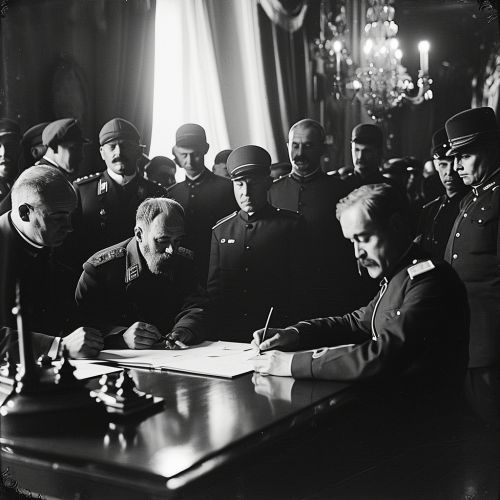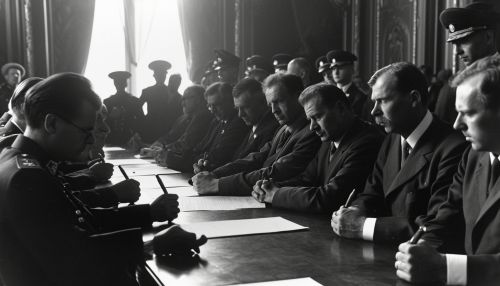Treaty of Brest-Litovsk
Background
The Treaty of Brest-Litovsk was a peace treaty signed on March 3, 1918, between the new Bolshevik government of Russia and the Central Powers (Germany, Austria-Hungary, Bulgaria, and the Ottoman Empire), that ended Russia's participation in World War I. The treaty was signed at Brest-Litovsk (now Brest, Belarus), after two months of negotiations. The treaty was forced on the Bolshevik government by the threat of further advances by German and Austrian forces.


Negotiations
The negotiations for the treaty began on December 22, 1917, in Brest-Litovsk. The Russian delegation was led by Adolf Joffe, while the Central Powers' delegation was led by the German politician Richard von Kühlmann. The negotiations were marked by significant power dynamics, with the Central Powers having the upper hand due to their military advantage. The Bolsheviks, on the other hand, were in a precarious situation, having just come to power following the October Revolution and facing opposition from both within and outside Russia.
Terms of the Treaty
The terms of the Treaty of Brest-Litovsk were harsh for Russia. The country lost a significant portion of its territory, as the treaty recognized the independence of Ukraine, Georgia, and Finland; territories that were formerly part of the Russian Empire. Russia also had to give up its claims to Poland and the Baltic states of Estonia, Latvia, and Lithuania. In addition, Russia had to pay a large indemnity to the Central Powers.
Impact of the Treaty
The Treaty of Brest-Litovsk had a significant impact on Russia and the rest of the world. For Russia, the treaty resulted in a significant loss of territory and resources. It also led to widespread dissatisfaction among the Russian population, contributing to the civil unrest that would eventually lead to the Russian Civil War. Internationally, the treaty upset the balance of power in Europe and was a significant factor in the end of World War I. It also set a precedent for the punitive peace terms that would be imposed on Germany by the Treaty of Versailles in 1919.
Aftermath
The Treaty of Brest-Litovsk was short-lived. It was annulled by the Armistice of 11 November 1918 that ended World War I. The territories that Russia had lost were theoretically recognized as independent nations by the Central Powers, but in reality, many of these territories were in a state of turmoil and were not able to maintain their independence. Following the end of World War I, many of these territories were incorporated into the newly formed Soviet Union.
